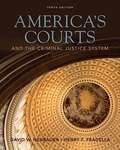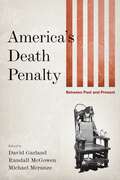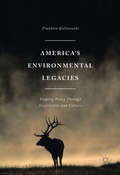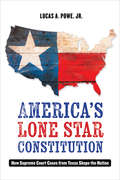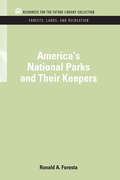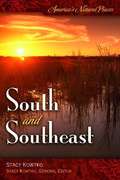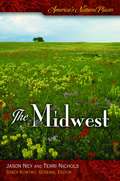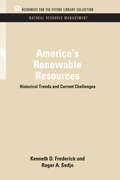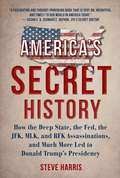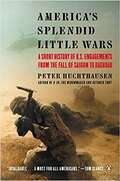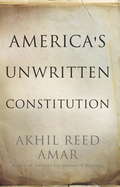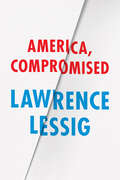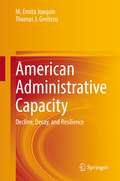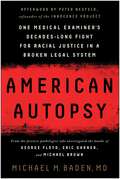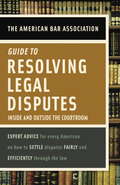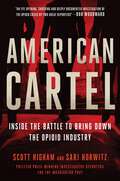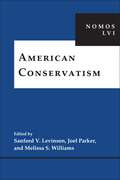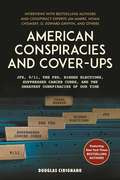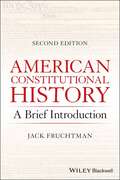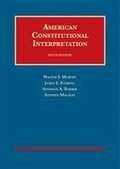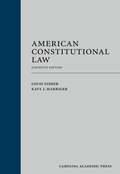- Table View
- List View
America's Courts and the Criminal Justice System, 10th Edition
by David W. Neubauer Henry F. FradellaOpen this book and step into America's court system! With Neubauer and Fradella's best-selling text, you will see for yourself what it is like to be a judge, a prosecutor, a defense attorney, and more. This fascinating and well-researched text gives you a realistic sense of being in the courthouse--you will quickly gain an understanding of what it is like to work in and be a part of the American criminal justice system. This concept of the courthouse "players" makes it easy to understand each person's important role in bringing a case through the court process. Throughout the text, the authors highlight not only the pivotal role of the criminal courts but also the court's importance and impact on society as a whole.
America's Death Penalty: Between Past and Present
by David Garland Michael Meranze Randall McGowenOver the past three decades, the United States has embraced the death penalty with tenacious enthusiasm. While most of those countries whose legal systems and cultures are normally compared to the United States have abolished capital punishment, the United States continues to employ this ultimate tool of punishment. The death penalty has achieved an unparalleled prominence in our public life and left an indelible imprint on our politics and culture. It has also provoked intense scholarly debate, much of it devoted to explaining the roots of American exceptionalism.America’s Death Penalty takes a different approach to the issue by examining the historical and theoretical assumptions that have underpinned the discussion of capital punishment in the United States today. At various times the death penalty has been portrayed as an anachronism, an inheritance, or an innovation, with little reflection on the consequences that flow from the choice of words. This volume represents an effort to restore the sense of capital punishment as a question caught up in history. Edited by leading scholars of crime and justice, these original essays pursue different strategies for unsettling the usual terms of the debate. In particular, the authors use comparative and historical investigations of both Europe and America in order to cast fresh light on familiar questions about the meaning of capital punishment. This volume is essential reading for understanding the death penalty in America.Contributors: David Garland, Douglas Hay, Randall McGowen, Michael Meranze, Rebecca McLennan, and Jonathan Simon.
America's Dirty Wars
by Russell CrandallThis book examines the long, complex experience of American involvement in irregular warfare. It begins with the American Revolution in 1776 and chronicles big and small irregular wars for the next two and a half centuries. Examples taken from the American experience reveal that fighting - and, more so, winning - all types of wars is extraordinarily complex, frustrating, controversial and bloody. What is readily apparent in dirty wars is that failure is painfully tangible while success is often amorphous. Successfully fighting these wars often entails striking a critical balance between military victory and politics. America's status as a democracy only serves to make fighting - and, to a greater degree, winning - these irregular wars even harder. Rather than futilely insisting that Americans should not or cannot fight this kind of irregular war, Russell Crandall argues that we would be better served by considering how we can do so as cleanly and successfully as possible.
America's Environmental Legacies: Shaping Policy through Institutions and Culture
by Franklin KalinowskiThis powerful book focuses on the capacity of the American political system to respond to ecological challenges through policy perspectives, the constraints of our written Constitution, and the determination we muster to address these tests of national character. Put simply, this is a book about politics, policy, and political will. Kalinowski brilliantly shows that America's collective will is founded in the cultural values enunciated by the Founding Fathers, passed down through history with modifications, and comprises the essential missing ingredient in determining how we currently respond to crises. Thomas Jefferson, Alexander Hamilton, and James Madison had distinct ideas concerning the role that Nature might play in the future. Recognizing the origins and impacts of their environmental legacies is the key to interpreting where American environmental politics is today, how we got here, and where we might be headed.
America's Lone Star Constitution: How Supreme Court Cases From Texas Shape The Nation
by Lucas A. Powe Jr.Texas has created more constitutional law than any other state. In any classroom nationwide, any basic constitutional law course can be taught using nothing but Texas cases. That, however, understates the history and politics behind the cases. Beyond representing all doctrinal areas of constitutional law, Texas cases deal with the major issues of the nation. <p><p> Leading legal scholar and Supreme Court historian Lucas A. Powe, Jr., charts the rich and pervasive development of Texas-inspired constitutional law. From voting rights to railroad regulations, school finance to capital punishment, poverty to civil liberties, this wide-ranging and eminently readable book provides a window into the relationship between constitutional litigation and ordinary politics at the Supreme Court, illuminating how all of the fiercest national divides over what the Constitution means took shape in Texas.
America's National Parks and Their Keepers (RFF Forests, Lands, and Recreation Set)
by Ronald A. ForestaFirst Published in 2011. Routledge is an imprint of Taylor & Francis, an informa company.
America's Natural Places: Pacific And West
by Methea K. SappFrom Alaska As Arctic National Wildlife Refuge to the Milnes and Prairie Preserve of New Mexico, this volume provides a snapshot of the most spectacular and important natural places in the western United States.
America's Natural Places: South And Southeast
by Stacy S. KowtkoFrom the Texas Blackland Prairies to the Middle Atlantic Coastal Plain of the Carolinas, this volume provides a snapshot of the most spectacular and important natural places in the southern United States.
America's Natural Places: The Midwest
by Jason Ney Terri NicholsFrom Iowa's Decorah Ice Cave to the Kitty Todd Nature Preserve in Ohio, this volume provides a snapshot of the most spectacular and important natural places in the Midwestern United States.
America's Renewable Resources: Historical Trends and Current Challenges (RFF Natural Resource Management Set)
by Roger A. Sedjo Kenneth D. FrederickBy recording one country's experience with its vast natural resource base, America's Renewable Resources: Historical Trends and Current Challenges will help to inform the management of future demands on the resource base in the U.S. and throughout the world. The contributors focus specifically on renewable resources--water, forests, rangeland, cropland and soils, and wildlife--which possess the capacity to restore themselves after they have be consumed. Because this capacity can be destroyed and the time required for restoration can be very long, a balance in their use is necessary to sustain continued productivity. In arresting fashion, the authors trace the history of each resource's use from early colonial times through periods of dramatic, sometimes cataclysmic, changes in its utilization by an expanding, diversifying society. They show how unforeseen consequences have forced social institutions into existence and compelled policy makers, especially at the federal level, to deal with problems for which they were largely unprepared. America's Renewable Resources, by examining changes in demand, technologies, policies, and institutions, will assist both policy makers and the public at large to look past short-term events to the conditions fundamental to maintaining our future economic and environmental wellbeing. Originally published in 1991
America's Secret History: How the Deep State, the Fed, the JFK, MLK, and RFK Assassinations, and Much More Led to Donald Trump's Presidency
by Steve HarrisThe Truth Behind the Stories They Don&’t Want You to KnowAmerica&’s Secret History presents an undistorted picture of the history of the United States. Never in one volume have so many unknown facts that disprove America&’s history books been brought together in a cohesive historical context, all based on verifiable information. Utilizing the House of Representative&’s little-known 1953 Reece Committee revelations, the Carnegie, Rockefeller, Guggenheim, and Ford foundations have systematically controlled education and the high-level appointees to the US State Department for the last century with the full knowledge and approval of the United States government.Conclusive proof that there has been one attempted coup d&’état, and three successful peaceful coups in America&’s history, and that all were obvious Deep State initiatives to mold the government into its intended purposes.Twenty-six people owned the same wealth as the poorest 50 percent of the world (almost four billion people in 2020). America&’s Secret History shows how the Deep State, the Fed, and world governments caused this to happen. Not another conspiracy theory book, America&’s Secret History reveals The Truth Behind the Stories They Don&’t Want You to Know, weaving all of them together to explain just how we find ourselves in Donald Trump&’s America.
America's Splendid Little Wars: A Short History Of U. S. Engagements From The Fall Of Saigon to Baghdad
by Peter HuchthausenFrom the evacuation of Saigon in 1975 to the end of the twentieth century, the United States committed its forces to more than a dozen military operations. Offering a fresh analysis of the Iranian hostage rescue attempt, the invasions of Granada and Panama, the first Gulf War, the missions in Somalia and Bosnia, and more, author and distinguished U.S. naval captain Peter Huchthausen presents a detailed history of each military engagement through eyewitness accounts, exhaustive research, and his unique insider perspective as an intelligence expert. This timely and riveting military history is “a must-read for anyone seeking to understand the nature of war today” (Stephen Trent Smith).
America's Unwritten Constitution: The Precedents and Principles We Live By
by Akhil Reed AmarDespite its venerated place atop American law and politics, our written Constitution does not enumerate all of the rules and rights, principles and procedures that actually govern modern America. The document makes no explicit mention of cherished concepts like the separation of powers and the rule of law. On some issues, the plain meaning of the text misleads. For example, the text seems to say that the vice president presides over his own impeachment trial-but surely this cannot beright. As esteemed legal scholar Akhil Reed Amar explains inAmerica’s Unwritten Constitution, the solution to many constitutional puzzles lies not solely within the written document, but beyond it-in the vast trove of values, precedents, and practices that complement and complete the terse text. In this sequel toAmerica’s Constitution: A Biography, Amar takes readers on a tour of our nation’sunwrittenConstitution, showing how America’s foundational document cannot be understood in textual isolation. Proper constitutional interpretation depends on a variety of factors, such as the precedents set by early presidents and Congresses; common practices of modern American citizens; venerable judicial decisions; and particularly privileged sources of inspiration and guidance, including theFederalistpapers, William Blackstone’sCommentaries on the Laws of England, the Northwest Ordinance of 1787, Lincoln’s Gettysburg Address, and Martin Luther King, Jr. ’s "I Have a Dream” speech. These diverse supplements are indispensible instruments for making sense of the written Constitution. When used correctly, these extra-textual aids support and enrich the written document without supplanting it. An authoritative work by one of America’s preeminent legal scholars,America’s Unwritten Constitutionpresents a bold new vision of the American constitutional system, showing how the complementary relationship between the Constitution’s written and unwritten components is one of America’s greatest and most enduring strengths.
America, Compromised: Five Studies In Institutional Corruption (Berlin Family Lectures)
by Lawrence Lessig“There is not a single American awake to the world who is comfortable with the way things are.” So begins Lawrence Lessig's sweeping indictment of contemporary American institutions and the corruption that besets them. We can all see it—from the selling of Congress to special interests to the corporate capture of the academy. Something is wrong. It’s getting worse. And it’s our fault. What Lessig shows, brilliantly and persuasively, is that we can’t blame the problems of contemporary American life on bad people, as our discourse all too often tends to do. Rather, he explains, “We have allowed core institutions of America’s economic, social, and political life to become corrupted. Not by evil souls, but by good souls. Not through crime, but through compromise.” Every one of us, every day, making the modest compromises that seem necessary to keep moving along, is contributing to the rot at the core of American civic life. Through case studies of Congress, finance, the academy, the media, and the law, Lessig shows how institutions are drawn away from higher purposes and toward money, power, quick rewards—the first steps to corruption. Lessig knows that a charge so broad should not be levied lightly, and that our instinct will be to resist it. So he brings copious, damning detail gleaned from years of research, building a case that is all but incontrovertible: America is on the wrong path. If we don’t acknowledge our own part in that, and act now to change it, we will hand our children a less perfect union than we were given. It will be a long struggle. This book represents the first steps.
American Administrative Capacity: Decline, Decay, and Resilience
by Thomas J. Greitens M. Ernita JoaquinThis volume proposes a capacity-centered approach for understanding American bureaucracy. The administrative institutions that made the country a superpower turned out to be fragile under Donald Trump’s presidency. Laboring beneath systematic accusations of deep statism, combined with a market oriented federal administration, bureaucratic capacity manifested its decay in the public health and constitutional cataclysms of 2020, denting America’s global leadership and contributing to its own people’s suffering. The authors combine interviews with a historical examination of federal administrative reforms in the backdrop of the recent pandemic and electoral tumult to craft a developmental framework of the ebb and flow of capacity. While reforms, large and small, brought about professionalization and other benefits to federal administration, they also camouflaged a gradual erosion when anti-bureaucratic approaches became entrenched. A sclerotic, brittle condition in the government’s capacity to work efficiently and accountably arose over time, even as administrative power consolidated around the executive. That co-evolutionary dynamic made federal government ripe for the capacity bifurcation, delegitimization, and disinvestment witnessed over the last four years. As the system works out the long-term impacts of such a deconstruction, it also prompts a rethinking of capacity in more durable terms. Calling attention to a more comprehensive appreciation of the dynamics around administrative capacity, this volume argues for Congress, citizens, and the good government community to promote capacity rebuilding initiatives that have resilience at the core. As such, the book will be of interest to citizens, public reformers, civic leaders, scholars and students of public administration, policy, and public affairs.
American Apocalypse: The Six Far-Right Groups Waging War on Democracy
by Rena SteinzorA thorough analysis of the right-wing interests contributing to the downfall of American democracy The war on American democracy is at a fever pitch. Such a corrosive state of affairs did not arise spontaneously up from the people but instead was pushed, top-down, by six private sector special interest groups—big business, the House Freedom Caucus, the Federalist Society, Fox News, white evangelicals, and armed militias. In American Apocalypse Rena Steinzor argues that these groups are nothing more than well-financed armies fighting a battle of attrition against the national government, with power, money, and fame as their central motivations. The book begins at the end of Lyndon Johnson's presidency, when the modern regulatory state was born. Agencies like the Environmental Protection Agency and the Food and Drug Administration ensured that everything from our air to our medicine was safe. But efforts to thwart this "big government" agenda began swiftly, albeit in the shadows. Business leaders built a multi-billion dollar presence in the Capitol, and the rest of the six interest groups soon followed. While the groups do not coordinate their attacks, and sometimes their short-term goals even conflict, their priorities fall within a surprisingly tight bullseye: the size and power of the administrative state. In the near-term, their campaigns will bring the crucial functions of government to a halt, which will lead to immediate suffering by the working classes, and a rapid deterioration of race relations. Over the long-term, as the prevalence of global pandemics and climate crises increase, an incapacitated national government will usher in unimaginable harm. This book is the first to conceptualize these groups together, as one deconstructive and awe-inspiring force. Steinzor delves into each of their histories, mapping the strategies, tactics, and characteristics that make them so powerful. She offers the most comprehensive story available about the downfall of American democracy, reminding us that only by recognizing what we are up against can we hope to bring about change.
American Autopsy: One Medical Examiner's Decades-Long Fight for Racial Justice in a Broken Legal System
by Michael M. BadenA revealing history of covering up the true causes of deaths of BIPOC in custody—from the forensic pathologist whose work changed the course of the George Floyd, Eric Garner, and Michael Brown cases Dr. Michael Baden has been involved in some of the most high-profile civil rights and police brutality cases in US history, from the government&’s 1976 re-investigation of the assassination of Martin Luther King, Jr., to the 2014 death of Michael Brown, whose case sparked the initial Ferguson protests that grew into the Black Lives Matter movement. The playbook hasn&’t changed since 1979, when Dr. Baden was demoted from his job as New York City&’s Chief Medical Examiner after ruling that the death of a Black man in police custody was a homicide. So in 2020 when the Floyd family, wary of the same system that oversaw George Floyd&’s death, needed a second opinion—Dr. Baden is who they called. In these pages, Dr. Baden chronicles his six decades on the front lines of the fight for accountability within the legal system—including the long history of medical examiners of using a controversial syndrome called excited delirium (a term that shows up in the pathology report for George Floyd) to explain away the deaths of BIPOC restrained by police. In the process, he brings to life the political issues that go on in the wake of often unrecorded fatal police encounters and the standoff between law enforcement and those they are sworn to protect. Full of behind-the-scenes drama and surprising revelations, American Autopsy is an invigorating—and enraging—read that is both timely and crucial for this turning point in our nation&’s history.
American Bar Association Guide to Resolving Legal Disputes: Inside and Outside the Courtroom
by American Bar AssociationWhether you’re fighting with a neighbor about who should pay for a fence, pursuing a charge of discrimination at work, or chasing a $5000 loan, theABA Guide toResolving Legal Disputes: Inside and Outside the Courtroomcan help you decide what steps to take to resolve disputes. This book, written in easy-to-read language with dozens of real-life examples, includes tips on how to be a better negotiator. It also provides important information about mediation, arbitration, small claims court, and civil court procedures, and includes a chapter on working with a lawyer, with tips on how you can save time and money.
American Bar Association Guide to Wills and Estates, Fourth Edition
by American Bar AssociationThe American Bar Association Guide to Wills & Estates, Fourth Edition, is the user-friendly guide that contains everything you need to know about planning an estate and preparing a will. It is organized in easy-to-follow chapters with sidebars containing tips, checklists, and key information, encouraging you to begin the process quickly and easily.The ABA Guide to Wills & Estates will help you:* Determine what to put in an estate plan* Decide whether to prepare a will, trust, or living trust* Avoid or reduce estate taxes* Transfer property without a will with substitutes such as life insurance and joint tenancy* Understand the benefits of living gifts and life insurance, among many other topics The Fourth edition features new and updated topics, such as: * Life-threatening and chronic illnesses* Incorporating your religious beliefs into your estate plan * Assisted reproduction and its resulting estate planning implications* Civil unions and same-sex marriages* Elder abuse and care* Information about Roth IRAs in estate plans* The impact of digital assets on estate planning
American Cartel: Inside the Battle to Bring Down the Opioid Industry
by Sari Horwitz Scott HighamThe definitive investigation and exposé of how some of the nation's largest corporations created and fueled the opioid crisis—from the Pulitzer Prize-winning Washington Post reporters who first uncovered the dimensions of the deluge of pain pills that ravaged the country and the complicity of a near-omnipotent drug cartel. AMERICAN CARTEL is an unflinching and deeply documented dive into the culpability of the drug companies behind the staggering death toll of the opioid epidemic. It follows a small band of DEA agents led by Joseph Rannazzisi, a tough-talking New Yorker who had spent a storied thirty years bringing down bad guys; along with a band of lawyers, including West Virginia native Paul Farrell Jr., who fought to hold the drug industry to account in the face of the worst man-made drug epidemic in American history. It is the story of underdogs prevailing over corporate greed and political cowardice, persevering in the face of predicted failure, and how they found some semblance of justice for the families of the dead during the most complex civil litigation ever seen.The investigators and lawyers discovered hundreds of thousands of confidential corporate emails and memos during courtroom combat with legions of white-shoe law firms defending the opioid industry. One breathtaking disclosure after another—from emails that mocked addicts to invoices chronicling the rise of pill mills—showed the indifference of big business to the epidemic&’s toll. The narrative approach echoes such work as A Civil Action and The Insider, moving dramatically between corporate boardrooms, courthouses, lobbying firms, DEA field offices, and Capitol Hill while capturing the human toll of the epidemic on America&’s streets.AMERICAN CARTEL is the story of those who were on the front lines of the fight to stop the human carnage. Along the way, they suffer a string of defeats, some of their careers destroyed by the very same government officials who swore to uphold the law before they begin to prevail over some of the most powerful corporate and political influences in the nation.
American Conservatism: NOMOS LVI (NOMOS - American Society for Political and Legal Philosophy #10)
by Melissa S. Williams Sanford V. Levinson Joel ParkerA collection of essays that unpacks the history, nature, development, and beliefs of American ConservatismThe topic of American conservatism is especially timely—and perhaps volatile. Is there what might be termed an “exceptional” form of conservatism that is characteristically American, in contrast to conservatisms found in other countries? Are views that are identified in the United States as conservative necessarily congruent with what political theorists might classify under that label? Or does much American conservatism almost necessarily reflect the distinctly liberal background of American political thought?In American Conservatism, a distinguished group of American political and legal scholars reflect on these crucial questions, unpacking the very nature and development of American conservative thought. They examine both the historical and contemporary realities of arguments offered by self-conscious conservatives in the United States, offering a well-rounded view of the state of this field. In addition to synoptic overviews of the various dimensions of American conservative thought, specific attention is paid to such topics as American constitutionalism, the role of religion and religious institutions, and the particular impact of the late Leo Strauss on American thought and thinkers. Just as American conservatism includes a wide, and sometimes conflicting, group of thinkers, the essays in this volume themselves reflect differing and sometimes controversial assessments of the theorists under discussion.
American Conspiracies and Cover-ups: JFK, 9/11, the Fed, Rigged Elections, Suppressed Cancer Cures, and the Greatest Conspiracies of Our Time
by Douglas CirignanoInterviews with Jim Marrs, Noam Chomsky, G. Edward Griffin, and Other Experts “Those intrepid souls seeking to peer deeper into America’s greatest conspiracies should start with Douglas Cirignano’s voluminous book. Pick your favorite conspiracy—Cirignano has them all, with incisive interviews with knowledgeable experts. Don’t miss this tour de force of conspiracy facts." —Jim Marrs, journalist and New York Times bestselling author of Rule by Secrecy; The Rise of the Fourth Reich; The Trillion-Dollar Conspiracy; and Population Control: How Corporate Owners Are Killing Us. American Conspiracies and Cover-ups brings together interviews with the bestselling and brightest minds in the alternative history world to create the definitive guide to our country’s biggest secrets. Interviews include:Jim Marrs on the New World OrderNoam Chomsky on mainstream mediaThe JFK assassination with LBJ’s lawyerVeteran and author Robert B. Stinnet on Pearl HarborG. Edward Griffin on the Federal Reserve BankDr. William F. Pepper on MLK's assassinationProfessor David Ray Griffin on 9/11and more!Author Douglas Cirignano brings together the foremost experts in the field to answer these questions once and for all, and proves that mainstream histories don’t tell the real story.
American Constitutional History: A Brief Introduction
by Jack FruchtmanReveals how the Constitution has evolved over the past 235 years, featuring updated coverage of the 2020 presidential election and constitutional changes made by the Supreme Court up to June 2021 American Constitutional History: A Brief Introduction, Second Edition presents a concise and accessible history of the 235-year development of the Constitution since its ratification. The book is organized around five distinct periods in U.S. history—the New Republic, the Slave Republic, the Free-Market Republic, the Social Welfare Republic, and the Contemporary Republic—to demonstrate the evolution of the American republic and its founding document over time. With an engaging narrative approach, author Jack Fruchtman describes how constitutional changes have occurred through both formal amendments and informal decisions by the president, Congress, and the Supreme Court. Updated to cover the period from 2015 to 2021, the second edition examines the controversial presidential election of 2020 in which Donald Trump, despite losing the electoral and popular vote, claimed victory and espoused charges of widespread election fraud. New coverage of the addition of Neil Gorsuch, Brett Kavanaugh, and Amy Coney Barrett to the Supreme Court is complemented by discussion of important decisions made after 2015, including affirming same-sex marriage, a woman's right to abortion under certain circumstances, the right to own and carry a firearm, and the central place of religious liberty in American society. This book also: Highlights the Constitution's evolution through government regulation of the economy, individual and civil rights, and executive power Reflects the evolution of constitutional changes made by the Supreme Court up to June 2021 Discusses topics such as the ideological origins of the U.S Constitution, the Civil War and Reconstruction, the civil rights movement, and growth of executive power Includes chapter overviews, summaries, and descriptions of formal constitutional amendments ratified by the states American Constitutional History: A Brief Introduction, Second Edition is an excellent introductory textbook for upper-level undergraduate and graduate courses in American history and political science and a must-read for general readers seeking insights into the origins and evolution of the U.S. Constitution.
American Constitutional Interpretation (University Casebook Series)
by Sotirios A. Barber James E. Fleming Walter F. Murphy Stephen J. MacedoThis text uses original essays, cases, and materials to study the very enterprise by which a constitution is interpreted and a constitutional government created. It explores the American polity as both a constitutional and democratic entity. This volume is organized around a set of basic interrogatives: What is the constitution that is to be interpreted? Who are its authoritative interpreters? How should they go about their interpretive tasks? The new edition has been updated to include important new cases decided through June 2018, including Masterpiece Cakeshop, Ltd. v. Colorado Civil Rights Commission and National Institute of Family and Life Advocates v. Becerra. To maintain brevity, the authors have removed a number of cases from the casebook and placed them on the accompanying website.
American Constitutional Law
by Louis Fisher Katy HarrigerThis book, in addition to analyzing and including excerpts of court decisions, highlights the efforts of legislatures, executives, the states, and the general public to participate in an ongoing political dialogue about the meaning of the Constitution. It therefore rejects the idea that elected leaders and the public must passively receive and obey a series of unilateral and final judicial commands. The book covers all new developments in case law, congressional statutes, presidential policies, and initiatives undertaken by states under their own constitutions. Included are readings not only from cases but congressional floor debates, committee reports, committee hearings, presidential vetoes and statements, opinions of the Office of Legal Counsel in the Justice Department, state activity, Federalist papers, and professional journals. After introductory chapters on constitutional politics, the doctrine of judicial review, threshold requirements, judicial organization, and the process and strategy of decision making, the book focuses on these substantive areas: separation of powers (domestic and foreign affairs), federal-state relations, economic liberties, free speech and free press, religious freedom, due process, search and seizure, race, equal protection, privacy, and political participation. The book concludes with a chapter on efforts to curb the Supreme Court. Professors may choose between the one-volume casebound book or two paperbacks: Volume 1 on ''Constitutional Structures: Separated Powers and Federalism,'' and Volume 2 on ''Constitutional Rights: Civil Rights and Civil Liberties.''
